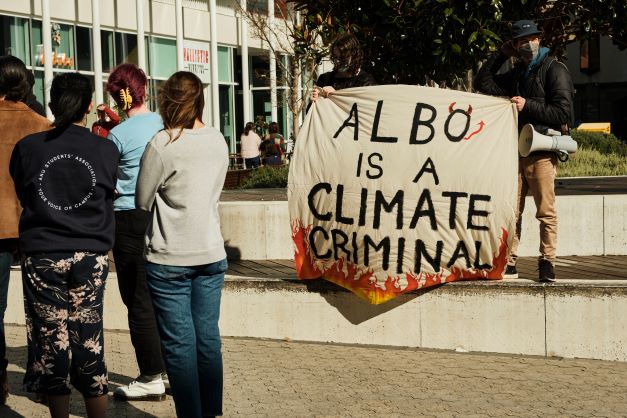The March 17th National Day of Action (NDA) is a national protest in opposition to the Labor government’s continued support of fossil fuel projects and industries. The National Union of Students (NUS), Socialist Alternative (SAlt), and ANUSA have all worked to organise the NDA here in Canberra. The protest aims to take action against “the Labor government’s addiction to fossil fuels.”
The NUS, founded in 1987, is the peak representative and advocacy body for all Australian university and higher education students. It was established with the purpose of supporting student unionism, and advancing student rights, academic advocacy, welfare and representation on a national scale.
There are multiple factions within the NUS. The most significant include SAlt, the National Labor Students (NLS) (Labor Left) and Student Unity (SU) (Labor Right). The President of the NUS and four of the twelve positions on the NUS executive are held by NLS. Unity is the biggest faction and holds seven of the executive positions. SAlt holds two executive position as education officer and Queer*/LGBTIQA+ Officer. Last year, Honi Soit reported that Unity and SAlt struck a deal for various executive positions.
Woroni contacted the NUS for comment, but received no reply before publication.
The NUS education officer, Xavier Dupé, claims that NLS and Unity are notorious for defending the Labor party against any criticism. Despite the factionalism and disagreement at the NUS, SAlt did confirm that “all of the political groups in the NUS support this rally and have made contributions to organising and promoting it.” SAlt however also claims that they are “the most active in publicly promoting it” since they pushed for the National Day of Action at NatCon 2022.
However, SAlt has come under factional criticism recently for its campaigning tactics. At a National Executive meeting last Tuesday, NUS Officers questioned Dupé repeatedly around accusations of aggressive campaigning. This included allegations of disrupting autonomous spaces, and leafleting students while waiting in line for food. At the ANU, students on ANU Confessions and Schmidtposting occasionally criticise SAlt for their stalls on University Avenue.
Some non-SAlt NUS Officers have shown support for the NDA. ANU student and NUS Disability Officer, Isabella Harding (she/her) participated in a surprise protest at ANU Commencement earlier this year. NUS President Bailey Riley has also been a face of the NDA organising campaign.
Ben Yates, ANUSA President, told Woroni that “ANUSA representatives have been supporting the rally through resourcing and promotion since the rally was called at the NUS National Conference in December 2022”.
He adds, “NUS has an obligation to take up activist politics and direct its resources towards mobilising campaigns rather than lobbying trips to Parliament House. NUS should take up campaigns that speak to the key crisis [sic] of the moment like cost of living, housing, climate disaster and attacks on education.” SAlt and other independents often criticise the NUS for relying on lobbying, rather than direct activism. NLS and Unity often use the slogan “If you’re not at the table, you’re on the menu,” as a response to this criticism.
While students have more free time than the average person, exam stress, class and casual work can all be barriers to protesting. Additionally at the ANU, many students aim for a job in the Australian Public Service and so often avoid political actions and movements.
Students can also disagree with the best action to take. Protests for some feel like the last resort. ANU student Chloe, for example, told Woroni that a petition is a better form of activism than protesting, as it has tangible results that you can show to the government.
Yates argues “students can’t win anything by asking nicely because the people in power are the same people who are perpetuating climate disaster. We have to fight.”
However, at SRC 2 yesterday, ANUSA Education Officer Beatrice Tucker argued that using the NUS – which lost $10,000 to financial “mismanagement” lost year – to galvanize students, is not the most effective strategy.
Nick Reich, a member of SAlt, tells Woroni he hopes to “build a fighting street movement to challenge this state of affairs, similar to the scale of the movement in 2019 and the summer of 2020. This means mass street demonstrations, protests which disrupt business as usual and a culture of political discussion around radical climate politics and protest.”
The rally will be held at 1pm in Kambri this Friday (March 17th).
We acknowledge the Ngunnawal and Ngambri people, who are the Traditional Custodians of the land on which Woroni, Woroni Radio and Woroni TV are created, edited, published, printed and distributed. We pay our respects to Elders past and present. We acknowledge that the name Woroni was taken from the Wadi Wadi Nation without permission, and we are striving to do better for future reconciliation.
